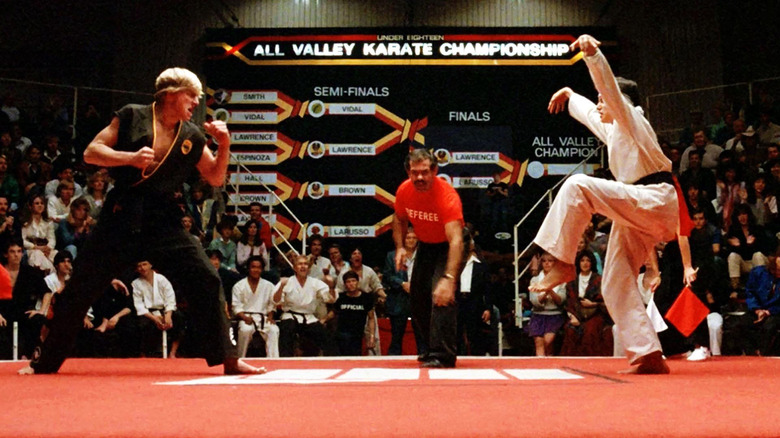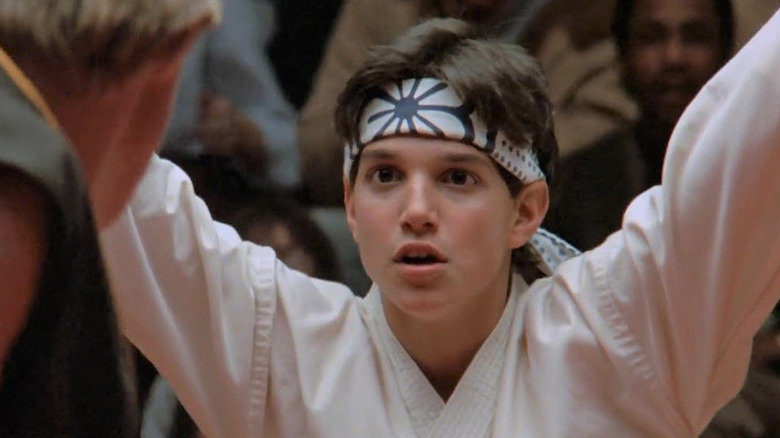The Karate Kid's Famous Crane Kick Was A Headache For Ralph Macchio, Seasoned Stuntmen, And Pro Martial Artists
Imagining the climax of "The Karate Kid" without Daniel LaRusso's iconic crane kick is like trying to listen to John Williams' "Duel of the Fates" without a lightsaber battle. All seems lost after our underdog hero played by Ralph Macchio has had his leg swept by the villainous Johnny Lawrence (Billy Zabka), but thanks to the balancing act of a crane kick, LaRusso wins the tournament and scores his winning point with the move.
Ironically, the crane kick almost didn't happen, because it's not only a completely made-up move for the film, but it's ridiculously hard to execute. In Macchio's new memoir, "Waxing On: The Karate Kid and Me," there's an entire passage about the crane kick that almost never was. According to Macchio's book (which /Film's own Jenna Busch recently spoke with Macchio about), the crane kick was invented by screenwriter Robert Mark Kamen, a move that sounded cool on paper and would have a cinematic look, regardless of its practical effectiveness.
"It worked so well on paper and paid off beautifully on the page, but in actual, practical reality, it was not so easy to achieve," Macchio wrote. "And at first, it was perfectly impossible to execute from script to screen." The move was described as LaRusso balancing on one leg due to the injury, then throwing a high front snap kick before landing back on the good leg that provided the kick. This meant the injured leg would never touch the ground. It's a beautiful idea, but as Macchio tells it, seasoned stuntmen and professional martial artists all attempted to pull off the crane kick, but nothing was working.
The crane kick required acrobatic training
Ballet dancers and acrobats are no strangers to performing kicks, leaps, and jumps that allow one foot to never touch the ground, but they usually allow for a "wind up" or running start. The crane kick is executed from a standing position, which made it nearly impossible for someone to generate the necessary momentum to get enough height to pull off the move. Macchio recalled:
"No one could effectively stick the landing without seeming off-balance. If I remember correctly, there was even talk of doing it with wires to achieve the height necessary to throw the kick with enough time to return the good leg to the base position for landing."
Fortunately, an acrobatic martial artist named Darryl Vidal figured out how to make it work. Vidal appeared as one of Johnny Lawrence's semifinal opponents in "The Karate Kid" and doubled for Pat Morita as Mr. Miyagi on the log at the beach when Daniel-san sees the technique silhouetted in the distance. "Darryl was a spectacular aerial martial artist, almost balletic in his fluidity," said Macchio. "His ability and technique created a seamless move and the blueprint for what Daniel-san needed to achieve." Macchio worked tirelessly with Darryl and martial arts choreographer Pat Johnson to learn the technique, ensuring that Macchio wouldn't need a stunt double to do the move for him. "That was not an option in my mind," he said.
They shot the crane kick around 30 times
While the singular shot shown in "The Karate Kid" has become an underdog sports movie classic, Macchio said the crane kick scene was shot somewhere around 30 times. "We shot it from multiple angles as well, sometimes in slow motion, sometimes super close for impact," he said. "Those shots were never used in 'The Karate Kid,' only the low, wide angle." It wasn't until "Cobra Kai" that any of the other angles were revealed to the public. Macchio added:
"In 'The Karate Kid' itself, the moment was all about the victory for Daniel LaRusso and Mr. Miyagi's magic. The bully got his comeuppance. The crowd jumped to their feet cheering for their hero. Euphoria. To the victor went the spoils. Something iconic was born on that shooting day."
Before "Cobra Kai" became a hit series, it was originally supposed to be a movie, and the creators were given access to the Sony/Columbia Pictures film vault and were able to use camera angles never edited into the original movie for their new movie. "It's interesting to note that when we used close-ups and slow-motion versions of the kick in the TV series, it altered the perspective," Macchio said. "But I still never expected that crane kick to catapult the movie's climax into the stratosphere the way it did."
"Waxing On: The Karate Kid and Me" by Ralph Macchio is on sale now. "Cobra Kai" is currently available to stream on Netflix.

